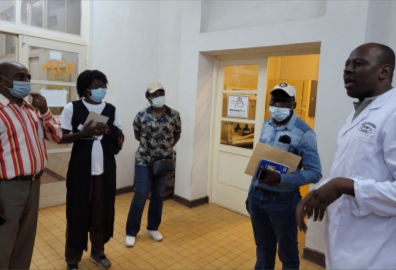Faculty from the University of Maryland Eastern Shore (UMES) and Southern University (SU) traveled to the
Democratic Republic of Congo (DRC) in October 2021 to engage Congolese partners in global food security
research and outreach opportunities.

Drs. Christopher Rogers and Stephan Tubene met with Congolese students, scientists and government officials including the National Institute for Study and Agronomic Research (INERA), the University of Kinshasa (UNIKIN), and the Ministry of Agriculture (MINAGRI) respectively. They also met with smallholder farmers and USAID officials in Kinshasa, the capital city of the DRC.
While the meetings with farmers helped the scientists to identify the most pressing global food security challenges faced by the producers, the discussions with INERA scientists contributed to the understanding of cassava and banana/plantain’s current and emerging diseases research opportunities. UNIKIN officials and students also expressed the needs to work collaboratively with their 1890 universities counterparts on specific themes of interest including faculty and students exchange, interlibrary loan opportunities, and other joint research collaborations.
A synopsis of potential collaborative projects are discussed as follows. For INERA, the collaboration will consist of implementing a train-the-trainer program with experts from the CEGFSD and INERA, utilizing up-to-date technologies to deliver training to the stakeholders in DRC, and the implementation of training in various aspects of food supply value chains including post-harvest technologies to minimize losses, small-scale processing of cocoa, coffee, etc., and the promotion of new INERA varieties of crops (i.e., rice, cocoa, coffee, banana, etc.). The partnership with UNIKIN will be focused on the establishment of students and faculty exchange programs between UNIKIN and the 1890 universities system. MINAGRI and DRC’s USAID Mission will also partner with the Center for the purposes of establishing MOUs between institutions and leveraging additional funds (buy-in of the Current and Emerging Threat to Crops Innovation Lab (CETC IL) activities by the Mission in DRC) respectively. Finally, collaborative efforts will also seek to address smallholder farmers’ immediate reforestation and staple food needs. This necessitates working closely with INERA to facilitate agroforestry technology transfer to farmers as well as providing training along the food supply value-chains ranging from community seed production system to staple food production, processing, and marketing.

